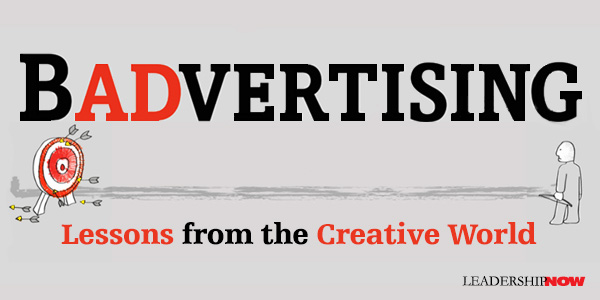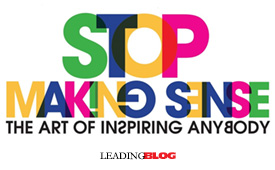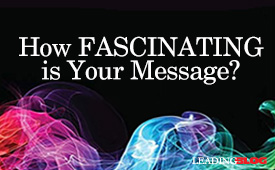Badvertising: Lessons from the Creative World

DIRECTED at the folks in advertising, Badvertising: An Exposé of Insipid, Insufferable, Ineffective Advertising contains lessons for all of us. Credited with some of the best advertising copy ever produced, Jim Morris has taken his experience in advertising and exposed in a series of essays the Agents of Stupidity that derail the process of creating, targeting, and evaluating advertising.
These same Agents of Stupidity hold leaders in all contexts back in a time when the clear thinking that leads to creativity and innovation is much needed. Some of the lessons include:
The sad reality, however, is that pandering to clients’ wants rather than identifying and meeting clients’ needs is one of the most pervasive Agents of Stupidity in our industry.
A critical or negative point of view—pointing out potential pitfalls, downsides, and so forth—is always easier and safer to formulate and articulate than a positive one. The risk of not sending an ad out into the world is never directly felt. There is no accountability—no risk—when you go thumbs down.
All it needs is a little time—enough to allow brains to get past an initial reaction to an idea and allow biases, predispositions, paranoia, second-guessing, and other mental maladies to propagate.
They can’t see through the cloudy veil of the perspective-skewing ether they inhabit way up there on the top floor. This blindness manifests as a function of their isolation, their insulation, their ego and arrogance, and their over-eagerness to please clients. Ironically, many of these traits are what got them into the rarified atmosphere of the C-suite in the first place.
If we make cleverness the goal—the end rather than the means—we usually fail. In the same way making “original” or “great” or “creative” the goal of any endeavor can be self-defeating. It is only cleverness in the service of the task at hand that is a worthy goal.
Be willing to put up with passion, regardless of how stubborn and contentious its host may be. Teach your passionate people how to sell persuasively rather than stridently, and how to make passion infectious. Teach them how and when and whether to give ground. Teach them to dress their passion publicly as enthusiasm and glee.
Sometimes a team working on an ad for weeks or months can get so immersed in the message they’re trying to convey that they think the commercial is clear and obvious when, in fact, it’s only clear and obvious to them because they have become so familiar with the story they’re trying to tell.
Naiveté on demand isn’t useful only in the advertising business. Whether in advertising, science, or any other discipline, this ability to suspend disbelief is a necessary requirement to succeed.
* * *

Like us on
Instagram and
Facebook for additional leadership and personal development ideas.
* * *




Posted by Michael McKinney at 02:15 PM
Permalink
| Comments (0)
| This post is about Marketing










